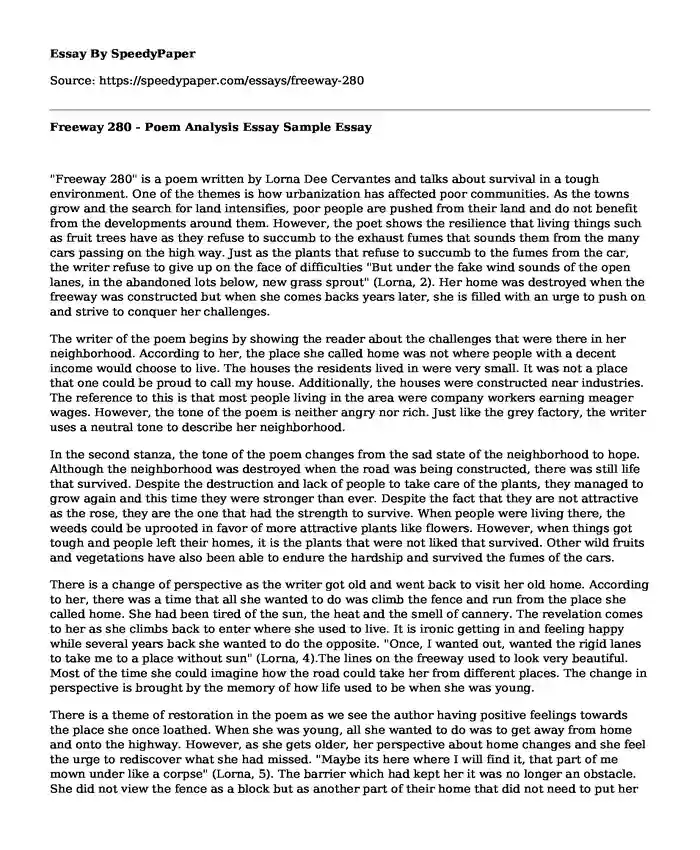"Freeway 280" is a poem written by Lorna Dee Cervantes and talks about survival in a tough environment. One of the themes is how urbanization has affected poor communities. As the towns grow and the search for land intensifies, poor people are pushed from their land and do not benefit from the developments around them. However, the poet shows the resilience that living things such as fruit trees have as they refuse to succumb to the exhaust fumes that sounds them from the many cars passing on the high way. Just as the plants that refuse to succumb to the fumes from the car, the writer refuse to give up on the face of difficulties "But under the fake wind sounds of the open lanes, in the abandoned lots below, new grass sprout" (Lorna, 2). Her home was destroyed when the freeway was constructed but when she comes backs years later, she is filled with an urge to push on and strive to conquer her challenges.
The writer of the poem begins by showing the reader about the challenges that were there in her neighborhood. According to her, the place she called home was not where people with a decent income would choose to live. The houses the residents lived in were very small. It was not a place that one could be proud to call my house. Additionally, the houses were constructed near industries. The reference to this is that most people living in the area were company workers earning meager wages. However, the tone of the poem is neither angry nor rich. Just like the grey factory, the writer uses a neutral tone to describe her neighborhood.
In the second stanza, the tone of the poem changes from the sad state of the neighborhood to hope. Although the neighborhood was destroyed when the road was being constructed, there was still life that survived. Despite the destruction and lack of people to take care of the plants, they managed to grow again and this time they were stronger than ever. Despite the fact that they are not attractive as the rose, they are the one that had the strength to survive. When people were living there, the weeds could be uprooted in favor of more attractive plants like flowers. However, when things got tough and people left their homes, it is the plants that were not liked that survived. Other wild fruits and vegetations have also been able to endure the hardship and survived the fumes of the cars.
There is a change of perspective as the writer got old and went back to visit her old home. According to her, there was a time that all she wanted to do was climb the fence and run from the place she called home. She had been tired of the sun, the heat and the smell of cannery. The revelation comes to her as she climbs back to enter where she used to live. It is ironic getting in and feeling happy while several years back she wanted to do the opposite. "Once, I wanted out, wanted the rigid lanes to take me to a place without sun" (Lorna, 4).The lines on the freeway used to look very beautiful. Most of the time she could imagine how the road could take her from different places. The change in perspective is brought by the memory of how life used to be when she was young.
There is a theme of restoration in the poem as we see the author having positive feelings towards the place she once loathed. When she was young, all she wanted to do was to get away from home and onto the highway. However, as she gets older, her perspective about home changes and she feel the urge to rediscover what she had missed. "Maybe its here where I will find it, that part of me mown under like a corpse" (Lorna, 5). The barrier which had kept her it was no longer an obstacle. She did not view the fence as a block but as another part of their home that did not need to put her outside. The way she views things have also changed tremendously. The highway that she used to admire was no longer pleasant but a feature that destroyed people's homes.
As the poem progress, the views and the tone of the author also changes. There is hope in her voice about the plants that grow back and even bear fruits. The comparison of her body to the corpse is meant to portray the lost opportunities that she had to enjoy life when she was living there as a young girl. However, as she looks at the grass sprouting, she is filled with confidence that maybe she can rediscover herself. Everything that surrounds her stops looking like an obstacle. The trees, fence and the grasses become images of hope, happiness, and the good memory that the author hopes she can be able to get back in her life.
Work cited
Lorna, Cervantes. "Freeway 280." Emplumada. New York: Random House 1981, 39-40, Print
Cite this page
Freeway 280 - Poem Analysis Essay Sample. (2022, Mar 01). Retrieved from https://speedypaper.com/essays/freeway-280
Request Removal
If you are the original author of this essay and no longer wish to have it published on the SpeedyPaper website, please click below to request its removal:
- Free Essay Sample on Positive Effects of Managed Care
- Free Essay on Importance of Essay Writing in Everyday Life
- Free Essay on Civil Liability
- Essay Sample: Classic Western Films on Racism and Victimization of Indians in America
- Free Essay: Change of Characters in the Story Bartleby the Scrivener by Herman Melville
- Essay Sample: Improving Patient Management through Better Communication between Health Care Providers
- Free Essay with the Review of Chapter 10: Advertising Whiteness
Popular categories





